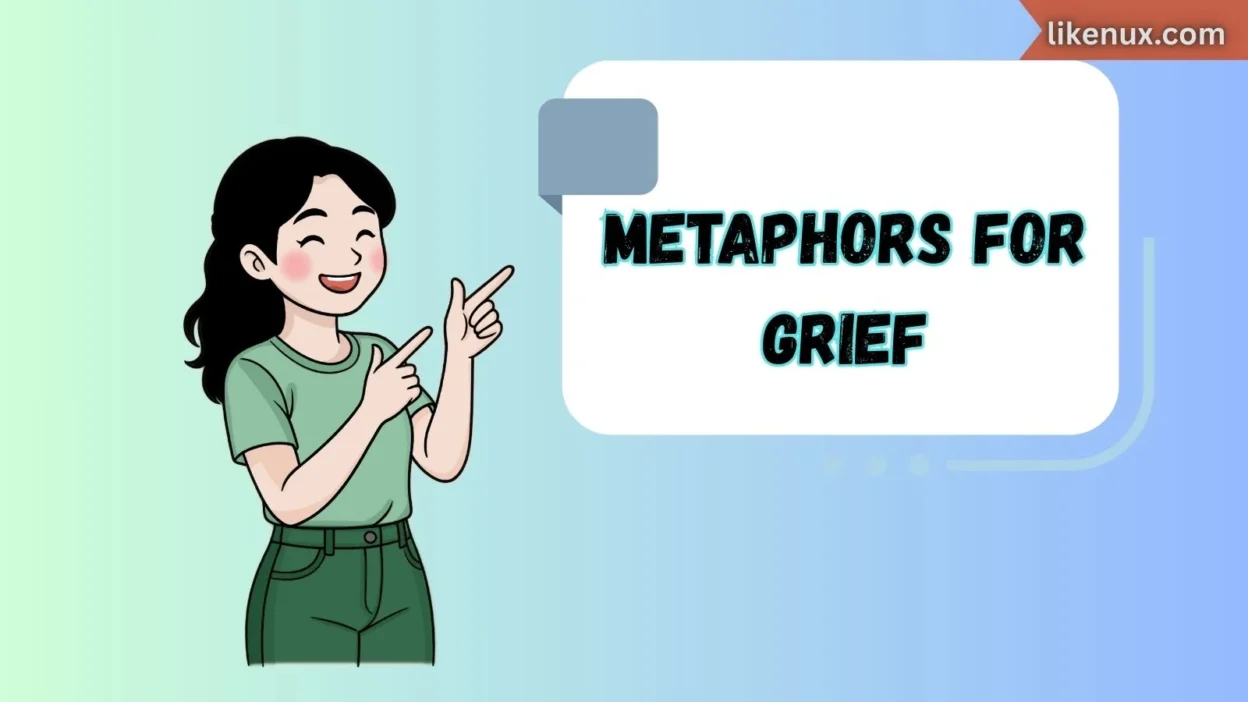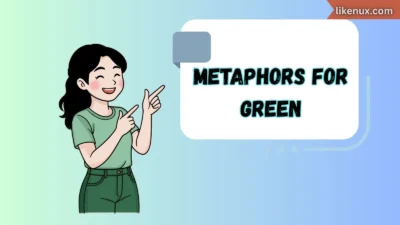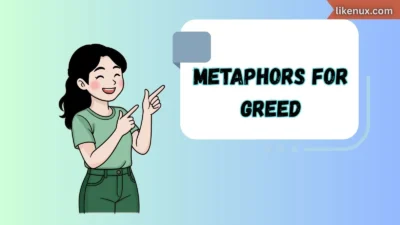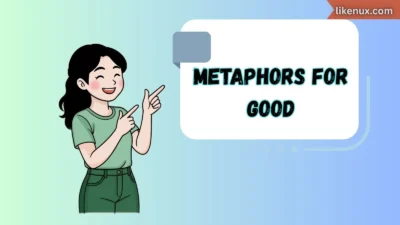Grief is one of the deepest emotions we can experience. It comes in waves, sometimes gentle and sometimes overwhelming. Finding the right words to describe grief can be difficult, but Metaphors for Grief often help express the feelings that plain sentences cannot. By comparing grief to familiar experiences, we can better communicate what we’re going through and connect with others who understand.
As someone who has supported friends through loss and carried my own quiet moments of sorrow, I’ve learned that metaphors offer comfort. They make the invisible pain more visible and help us explain what can feel impossible to describe. Below, you’ll find 25 metaphors for grief written with care, warmth, and thoughtful phrasing—designed to support you in expression and healing.
1. Grief is like an ocean
Meaning: A vast, deep, and endless force that moves with waves.
Sentence: Some days my grief feels calm, like ripples on the shore; other days it crashes like a stormy sea.
Best Use: To describe the unpredictable nature of emotions.
Other Ways to Say: Tide of sorrow, sea of sadness.
2. Grief is a heavy blanket
Meaning: A weight that covers and slows you down.
Sentence: The grief wrapped around me like a heavy blanket I couldn’t take off.
Best Use: To show the exhaustion and heaviness grief brings.
Other Ways to Say: Cloak of sorrow, veil of sadness.
3. Grief is a storm
Meaning: Chaotic, sudden, and difficult to control.
Sentence: Grief hit me like a storm, leaving me drenched in emotions I couldn’t contain.
Best Use: For sudden and overwhelming feelings.
Other Ways to Say: Tempest of loss, whirlwind of pain.
4. Grief is an empty chair
Meaning: A constant reminder of someone missing.
Sentence: Every family gathering felt incomplete, with an empty chair where my loved one used to sit.
Best Use: To express absence in daily life.
Other Ways to Say: Silence at the table, missing place.
5. Grief is a shadow
Meaning: Always present, even when unseen.
Sentence: Grief follows me quietly, like a shadow I cannot escape.
Best Use: To describe long-lasting sorrow.
Other Ways to Say: Lingering presence, unseen companion.
6. Grief is a locked room
Meaning: A place inside you that feels closed and unreachable.
Sentence: Sometimes grief feels like a locked room inside my heart.
Best Use: To express isolation and emotional walls.
Other Ways to Say: Hidden chamber, closed door of sorrow.
7. Grief is cracked glass
Meaning: Life feels fragile and changed forever.
Sentence: After losing him, my world felt like cracked glass—never the same again.
Best Use: To show permanent change and vulnerability.
Other Ways to Say: Shattered window, broken mirror.
8. Grief is a garden in winter
Meaning: Dormant, bare, and waiting for light again.
Sentence: My grief feels like a winter garden—silent, empty, and cold.
Best Use: For describing numbness and longing for renewal.
Other Ways to Say: Frozen field, lifeless soil.
9. Grief is a backpack of stones
Meaning: A heavy burden you carry daily.
Sentence: Grief felt like carrying a backpack of stones everywhere I went.
Best Use: To describe constant heaviness.
Other Ways to Say: Sack of sorrow, burden of loss.
10. Grief is unfinished music
Meaning: A song cut short or left incomplete.
Sentence: Her passing left me with a grief that felt like unfinished music.
Best Use: To capture loss of dreams or moments.
Other Ways to Say: Silent melody, broken tune.
11. Grief is a fire
Meaning: Burning and consuming, sometimes quietly smoldering.
Sentence: Inside, grief burned like a fire that wouldn’t go out.
Best Use: To show intensity of pain.
Other Ways to Say: Flame of sorrow, ember of loss.
12. Grief is a labyrinth
Meaning: A confusing path without clear direction.
Sentence: Grief feels like a labyrinth where every turn leads to another wall.
Best Use: To describe confusion in healing.
Other Ways to Say: Maze of emotions, tangled path.
13. Grief is a scar
Meaning: A permanent mark left by pain.
Sentence: Even when healing begins, grief remains like a scar on the heart.
Best Use: To show lasting change.
Other Ways to Say: Wound mark, emotional imprint.
14. Grief is a silent scream
Meaning: A loud pain that no one can hear.
Sentence: My grief was a silent scream locked inside my chest.
Best Use: For describing inner turmoil.
Other Ways to Say: Wordless cry, quiet anguish.
15. Grief is quicksand
Meaning: The more you fight it, the deeper you sink.
Sentence: Grief felt like quicksand pulling me under no matter how I resisted.
Best Use: To explain feeling trapped.
Other Ways to Say: Emotional swamp, sinking sorrow.
16. Grief is a long night
Meaning: Endless darkness without a dawn in sight.
Sentence: Those early months of grief felt like a night that would never end.
Best Use: To show hopelessness.
Other Ways to Say: Endless dusk, shadowed hours.
17. Grief is a broken clock
Meaning: Time feels stuck or meaningless.
Sentence: After the funeral, grief made time feel like a broken clock.
Best Use: To describe loss of routine.
Other Ways to Say: Stopped watch, frozen hourglass.
18. Grief is a storm cloud
Meaning: Dark and heavy, always looming overhead.
Sentence: My grief hovered like a storm cloud, waiting to pour down tears.
Best Use: For moodiness and sudden tears.
Other Ways to Say: Dark sky, looming thunder.
19. Grief is a book with missing pages
Meaning: A story cut short, incomplete.
Sentence: Life after her passing felt like a book with missing pages.
Best Use: To describe unfinished bonds.
Other Ways to Say: Torn chapters, incomplete story.
20. Grief is cold ashes
Meaning: Remnants of something once burning brightly.
Sentence: When he was gone, grief left me with cold ashes of memory.
Best Use: To show emptiness after intensity.
Other Ways to Say: Burnt remains, faded fire.
21. Grief is tangled roots
Meaning: Twisted, complex, and difficult to untangle.
Sentence: Grief spread in me like tangled roots under the ground.
Best Use: To describe deep emotional complexity.
Other Ways to Say: Knotted vines, entwined pain.
22. Grief is a locked diary
Meaning: Private and unspoken pain.
Sentence: Her grief stayed hidden, like a locked diary no one could read.
Best Use: For unexpressed emotions.
Other Ways to Say: Sealed journal, closed book.
23. Grief is a desert
Meaning: Dry, empty, and endless.
Sentence: Those years of grieving felt like walking through a desert with no end.
Best Use: To describe emptiness and longing.
Other Ways to Say: Barren land, wasteland of sorrow.
24. Grief is broken wings
Meaning: A loss of freedom and strength.
Sentence: Grief clipped my spirit, leaving me with broken wings.
Best Use: To show lost energy and hope.
Other Ways to Say: Grounded bird, shattered flight.
25. Grief is a candle in the dark
Meaning: Fragile light amidst deep pain.
Sentence: Though grief was heavy, love remained like a candle in the dark.
Best Use: To express hope within sorrow.
Other Ways to Say: Flickering flame, guiding light.
FAQs about Grief
1. Why do metaphors help describe grief?
Metaphors translate emotions into images, making it easier to explain deep feelings to others.
2. Is it normal for grief to feel different over time?
Yes, grief changes shape—it may be heavy at first and then soften, but it never truly disappears.
3. Can sharing metaphors help with healing?
Absolutely. Sharing your grief in words creates connection and helps others understand what you’re experiencing.
4. How can I support someone grieving?
Listen without judgment, use gentle words, and avoid pushing them to “move on” quickly.
5. Does grief ever fully end?
Grief may not end, but it changes. Over time, it becomes something you carry with more peace than pain.
Conclusion
Grief is deeply personal, yet universally shared. By using metaphors for grief, we create language for our emotions—words that honor our pain and help others see it more clearly. Whether your grief feels like an ocean, a heavy blanket, or a candle in the dark, remember this: you are not alone. Metaphors give us permission to express, connect, and heal at our own pace.

David Robert is a passionate innovator driven by creativity, vision, and purpose. He turns bold ideas into impactful realities through focus, leadership, and dedication.



